BPI Tech, a spinoff from SinoVoIP, has introduced a new single board computer with Banana Pi BPI-F2S powered by SunPlus SP7021 “Plus1” SoC with four Cortex-A7 cores, one older ARM9 real-time core, and one even older 8051 IO controller. The chip also embeds up to 512MB DDR3 memory.
The board comes an 8GB flash, dual Fast Ethernet, HDMI, a 40-pin Raspberry Pi compatible GPIO header, as well as headers for an optional Xilinx Artix-7 FPGA expansion board.
Banana Pi BPI-F2S SBC
Specifications:
- SoC – Sunplus SP7021 “Plus1” with a quad-core Cortex-A7 processor @ 1.0 GHz, one Arm A926 microprocessor, an 8051 core to handle I/Os, and 128MB or 512MB DDR3 DRAM.
- Storage – 8GB eMMC flash, microSD card slot
- Video Output – HDMI 1.4 output
- Camera I/F – MIPI CSI connector
- Connectivity – 2x 10/100M Ethernet
- USB – 2x USB 2.0 host ports, 1x micro USB port
- Expansion
- 40-pin GPIO header compatible with Raspberry Pi header
- 2x 50-pin FPGA interface for Trenz Electronic TE0725LP-01-100-2D Artix 7 FPGA board
- Undocumented 50-pin header that may be routed to the 40-pin RPI signals.
- Debugging – 3-pin header for UART console, 10-pin JTAG header, SWD ICE port
- Security – TPM 2.0 chip ST33TPH2EI2C
- Misc – Power switch, reset button, boot selection dip switch
- Power Supply – 12VDC via power barrel jack
- Dimensions – N/A
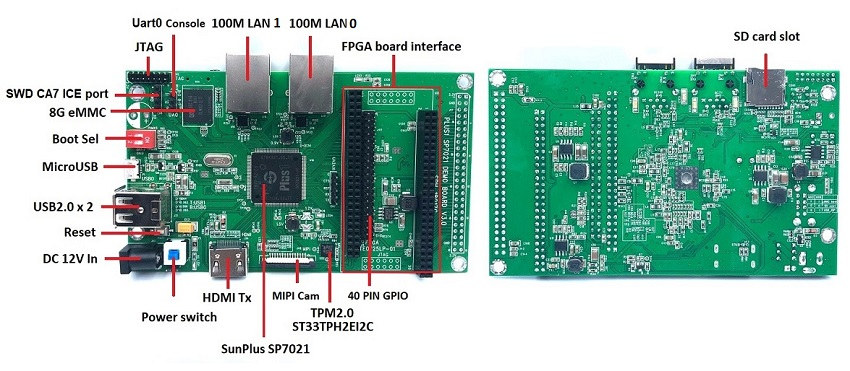
The company provides a Yocto-based Linux distribution for the board, but so far there’s no source code nor firmware for download. Sunplus Plus1 and BPI-F2S SBC are said to be suitable for IoT/Industrial Internet control, smart audio, smart payment, FPGA education & development, as well as automotive networking technology and applications.
BPi-F2S board was introduced on Hackster.io a few days ago, and more technical details can be found in wiki.banana-pi.org/Banana_Pi_BPI-F2S.
Trenz Electronic TE0725LP-01-100-2D Artix 7 FPGA Board
As mentioned in the specs, the board can take Trenz Electronic TEO725LP-01-100-2D FPGA module selling for 119 Euros ex. VAT.
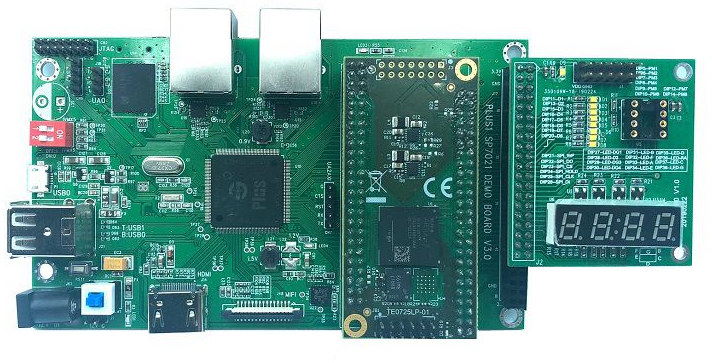 Trenz FPGA module specifications:
Trenz FPGA module specifications:
- FPGA – Xilinx Artix-7 XC7A100T-2CSG324C FPGA with 101,440 logic cells, 240 DSP slices, 8x GTP 6.6 Gbps transceivers
- System Memory & Storage – 32 MByte Flash memory, I2C EEPROM, optional HyperRAM or HyperFlash
- 2x 50 pin headers with 2.54 mm pitch
- 95x I/O’s (42 + 42 + 3 + 8)
- Suitable for breadboard use
- Clock – 25 MHz system clock (100 MHz can be customized on request)
- Debugging – JTAG/UART connector
- Misc – 1x user LED
- Power Supply – 1.8 V single supply with on-board voltage regulators
- Dimensions – 7.3 x 3.5 cm
- Temperature Range – Commercial (industrial on request)
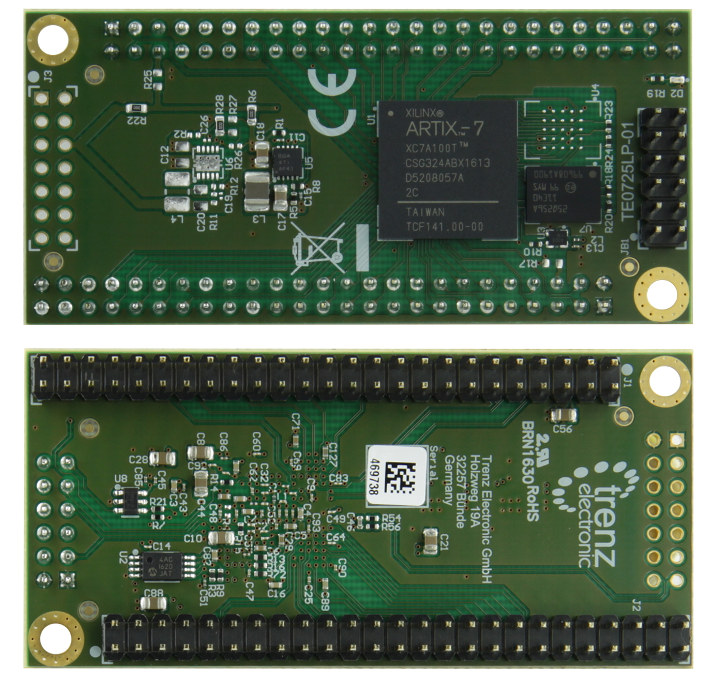
Sunplus SP7021 “Plus1″SoC
Sunplus Technology worked in collaboration with Tibbo Technology to design SP7021 “Plus1” SoC which targets industrial control and will have long term availability of 10 years.
Key features:
- CPU
- Quad-core Cortex-A7 CPU @ 1.0 GHz with 512KB L2 cache
- Arm A926 real-time core @ 202 MHz
- 8051 core for I/Os. 500uA @ 32KHz for the entire IC
- System Memory – 128MB or 512MB DDR3 DRAM
- Storage I/F – eMMC flash interface, SPI NOR / NAND flash interface, SD card interface
- Video Input/Output
- HDMI Tx 1.4
- Parallel LCD
- MIPI LCD camera interface
- Audio – TDM, PDM, I2S input & output
- Connectivity – Dual Ethernet MAC controllers with built-in Ethernet switch
- USB – 2x USB 2.0 HS/OTG interfaces
- Other I/Os & Peripherals
- 8x 8-bit 5V-tolerant IO ports, plus one high-current port.
- Up to 64x GPIO’s
- Up to 4x PWM
- 4x UART, 4x SPI, 4x I2C
- 4x Timers
- Special interface to connect to FPGA
- Flexible Peripheral Multiplexing (PinMux)
- Security – Secure Boot, Crypto Engine (RSA/AES/MD5/SHA3)
- Debug – SWD/JTAG and console UART
- Power Management
- Embedded DC-DC convert:
- Single 3.3V power supply
- 3.3V to 0.90V for CA7
- 3.3V to 1.5V for DDR3
- 3.3V to 1.2V for peripherals
- Embedded DC-DC convert:
- Package – 20x20mm LQFP176-EP package
- Temperature range – Industrial: -40°C ~ +85°C
Sunplus SP7021-IS comes with 128MB DDR3, while SP7021-IF gets 512MB DDR3. All I/Os and peripherals are said to 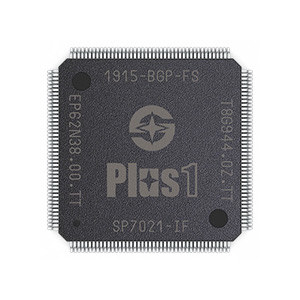 be accessible by Cortex-A7, ARM926, and 8051 cores.
be accessible by Cortex-A7, ARM926, and 8051 cores.
More details about the processor can be found on the processor’s Wiki. Documentation looks good enough to get started, but access to the source code requires username and password.
Sunplus SP7021-IF with 512MB RAM is sold for $20 on Tibbo website.
Via LinuxGizmos

Jean-Luc started CNX Software in 2010 as a part-time endeavor, before quitting his job as a software engineering manager, and starting to write daily news, and reviews full time later in 2011.
Support CNX Software! Donate via cryptocurrencies, become a Patron on Patreon, or purchase goods on Amazon or Aliexpress


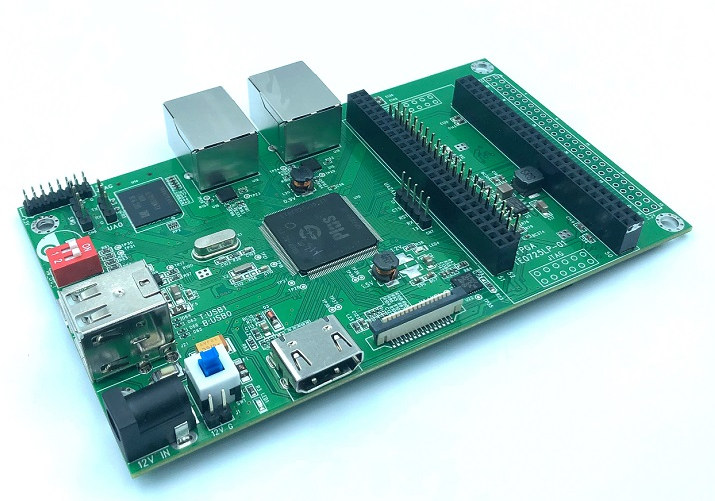
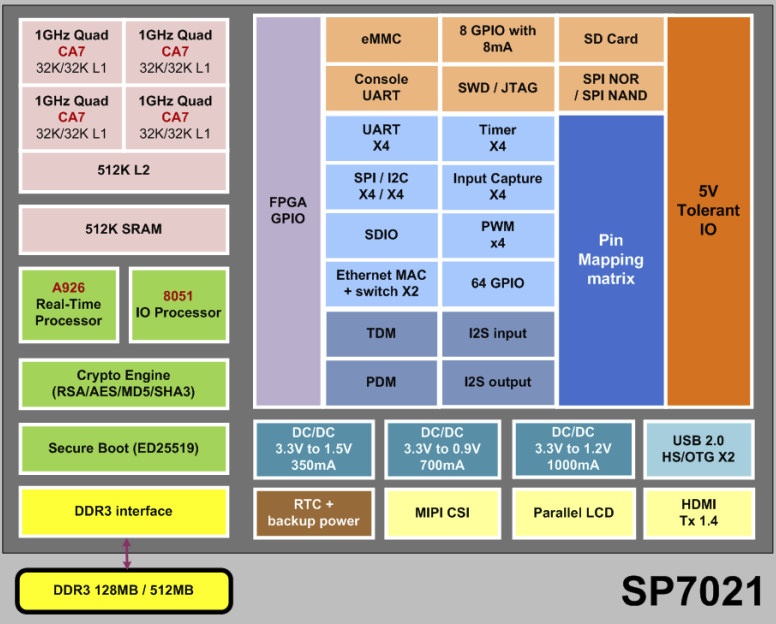



Hmm yet another banana pi with totally new soc.
now ,we use it as ic design education and FPGA development educationo at the university
Don’t care much for the board but that sunplus chip looks interesting. It’s a shame it’s a bit pricey.
The chip is industrial grade and supports the -40-85 temperature range
Is it? 20$ for 4xCortexA7 with integrated 512MB DDR, with additional ARM926 core and 8051 microcontroller and all of that in easy to use QFP176. Is it really expensive? No need for pmic – just 3.3V Easy PCB design thanks to integrated RAM and pin multiplexer. For me it’s not that expensive.
I bought few of them and I’m designing my own PCB for it. But the big problem is lack of detailed documentation. I contacted SunPlus and they say that they are finishing technical manual and soon will be available.
>Is it? 20$ for 4xCortexA7 with integrated 512MB DDR,
Single core A7 with memory is in the few dollars range now. A complete solder down module for a RK3308 with memory and storage is ~$10. The octavo SiP with the TI SoCs in them are this sort of price range.
>with additional ARM926 core and 8051 microcontroller
The extra ARM core is nice. You usually get something like an 8051 or a cortex m on SoCs like this for power management though.
>and all of that in easy to use QFP176.
It’s better than BGA for 2 layer boards but QFP sucks really. QFN is better IMHO just because the legs can’t get busted in shipping etc.
>Is it really expensive? No need for pmic – just 3.3V
Integrated PMIC is nice yes. But you get that with a SoM for $10 too.
>Easy PCB design thanks to integrated RAM and pin multiplexer.
>For me it’s not that expensive.
>I bought few of them and I’m designing my own PCB for it.
I’m a big fan of non-BGA ARM SoCs with integrated RAM. I’ve spent a bit of time of the last year reverse engineering a bunch of them. $20 is fine for a one off I guess but if it’s $20 for just this chip or $10 for a complete module well I’ll probably go for the module unless there is something like the dual ethernet I really really need.
On the other hand the chips I’ve been messing with that have integrated memory are really small (QFN80) and very cheap.
Octavo is nice but their price is so out of 20$ range., example: https://pl.mouser.com/ProductDetail/Octavo-Systems/OSD32MP157C-512M-BAA-ES?qs=%2Fha2pyFaduiA2shJvuMjqMkkPsiuOj9Vapno5MT1ZAt2TxSUGSgE7Q==
2 cores, slower BGA, etc.
Or maybe I can’t find what you mean.
> On the other hand the chips I’ve been messing with that have integrated memory are really small (QFN80) and > very cheap.
I’d be more than happy if you shared some more info like symbol, manufacturer, links, anything.
>Octavo is nice but their price is so out of 20$ range., example:
>Or maybe I can’t find what you mean.
Octavo say they are $26 at 1k units. Of course the specs aren’t the same but if you want a solid platform they would make sense. If you really need 4 cores the RK3308 modules might make more sense and so on. $20 seems expensive for an unknown brand with older A7 cores.
>I’d be more than happy if you shared some more info like symbol, manufacturer, links, anything.
Sure -> http://linux-chenxing.org/
It’s true that this chip is something new but it doesn’t sound reasonable to rule it out just because of that. SUNPLUS is that unknown.
It costs 20$ at 1 piece. I still think it’s not that expensive. Chips you linked are not general purpose devices. They are dedicated and probably not easy to buy. They are fine for what they were designed but not for general purpose as SP7021 is for.
I was looking for some alternative few weeks ago and couldn’t find anything so if the chip works fine then the price is really fine too.
But I’m afraid that there are many bugs in this IC as this is the very first revision. We’ll see.
>It costs 20$ at 1 piece. I still think it’s not that expensive.
$20 means it’s no good really for quick projects that might not work out. Of course if it works for your situation more power to you.
>Chips you linked are not general purpose devices.
They work just fine for a lot of things. Being IP camera chips is why they have DDR built in and are in QFN (so it’s easier to get the sensor on the other side of the board).
I have one driving a t-slot bar/3d printed rover around at the moment..
>They are dedicated and probably not easy to buy.
You can get them. You just need to order 2080 of them or wait for some to turn up. I have around about 100 of the msc313e. If you want one or two find my email address on github and I’ll send you some.
>They are fine for what they were designed but
> not for general purpose as SP7021 is for.
I’m not seeing that really. These things have SPI, i2c, PWM, GPIO with interrupts, ADC, multiple UARTs. They aren’t as well spec’d out as something like the AM35xx but for $3 you get something you can easily solder with hot air that runs real python3 and has most of the microcontroller-like interfaces you might want.
> If you want one or two find my email address on github and I’ll send you some.
Thanks for that. Some of the chips are really, really nice.
I also prefer QFN packages because I find them easier to solder than QFP even with hotair. But I have an reflow oven, thanks to which QFN is nothing special.
And QFN are significantly smaller than QFP which is quite important in almost every of my projects.
But SP7021 specs fits perfectly to one of current projects for my client so I will give it a try first.
Today I received 5 pieces of them, technical manual started to appear on the wiki, so 2 – 3 weeks and I should be ready to start software experiments on this “beast”.
Do you mind sharing some of the reverse engineering results you have gotten?
Checked the spec, but it seems no ADC ?
Anyone have the idea of where to buy this official demo board or evaluation kit? The Banana BPi-F2S board still not yet open for sell
There’s often a six months lag between Banana Pi announcements and actual availability.
BPI-F2S board is now available on
Aliexpress ($58): https://www.aliexpress.com/item/4000516679477.html
Taobao (390 RMB): https://item.taobao.com/item.htm?ft=t&id=610642319814